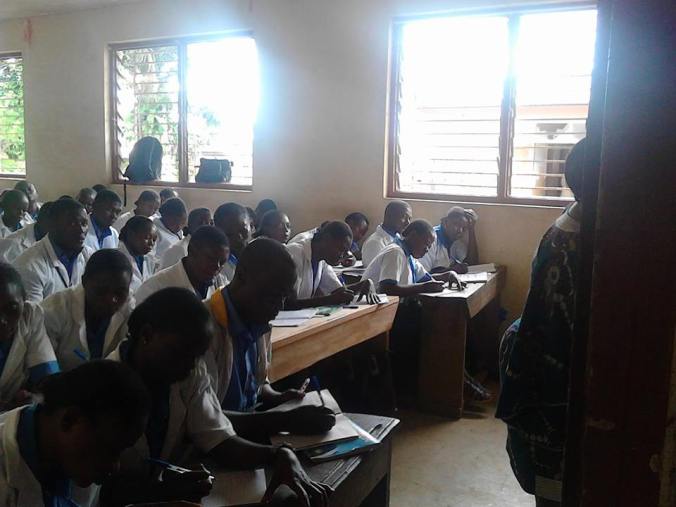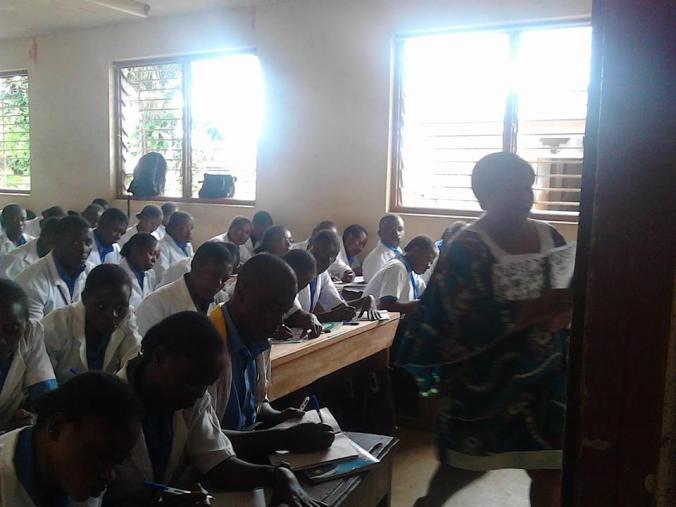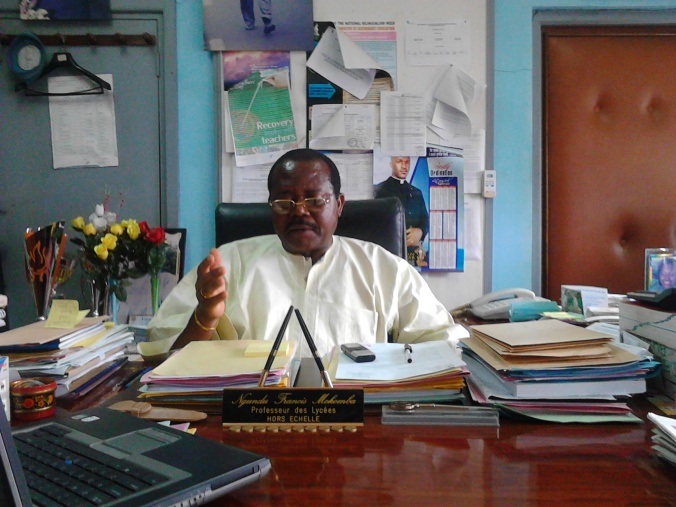Otu David Orock is indisputably one of those people who has
done a lot to push things forward as far as Technical Education in English speaking
Cameroon is concerned. Born on July 20, 1968 in Eyumujock Sub Division to Samuel Otu Ayuk
and Adina Oben Otu, he attended primary school at CBC Ewelle and Government
School Ajayukndip all in the Eyumujock Sub Division.
His quest for Secondary School Education took him to VOCAST
Muyuka in 1980. He however shifted to the legendary Government Technical
College Ombe in the Tiko Municipality where he studied from 1981 to 1985. He
eventually obtained his Baccalaureat in Government Technical
High School Kumba.
His pursuit for Higher Education took him to the Higher
Technical Teacher Training College known in its French acronym as ENSET in
Douala.
To have a better view of the man, an exclusive interview was carried out with this self effacing personality. This interview which was first published in Cameroon School News is again published bellow.
It is constantly said and with justification that hard work
can hardly ever completely go unnoticed. As a Chief of Works appointed from
Government Technical High School Nkambe to Government Technical High School
Alabukam in Bamenda, he received the following Honorary Awards: The most
assiduous staff of GTC Alabukam Mankon in the 2006-2007 Academic Year awarded
by the First Assistant Senior Divisional Officer for Mezam Division. He
received the same award in the 2007-2008 Academic year in the same
establishment and this time it was given by the Assistant Divisional Officer
for Bamenda II. In the 2008-2009 Academic year, he again received the award of
the most assiduous staff of Government Technical High School Alabukam Mankon in
Bamenda and this was awarded by the Mayor of Bamenda II.
In society he has held a number of responsibilities in social
organisations. Some of these include:
-
Secretary
General of the Njeke Cultural and Development Association from 1996 to 1998.
-
Secretary
General cum Financial Secretary of Njeke Cultural and Development Association
from 1998 to 2001.
-
Secretary
General of Nkambe Staff Socials from 2001 to 2006.
-
Discipline
Master of Veterans Sports Club Nkambe from 2004 to 2006.
-
Treasurer
of Nkambe Civil Servants HAND IN HAND Njangi
Group from 2004 to 2006.
-
Financial
Secretary of Government Technical High School Alabukam Financial Solidarity
Group from 2006 to 2009.
 |
| The Family Behind the man |
To have a better view of the man, an exclusive interview was carried out with this self effacing personality. This interview which was first published in Cameroon School News is again published bellow.
“Technical Education must be at the center of things for Cameroon to emerge”
As an educationist who exactly is Ottu David Orock?
I was a trained Technical student from the then lone Technical College in West Cameroon; Government Technical College GTC Ombe. I completed there in the year 1985 and left for Government Technical High School Kumba in the year 1985- 1986 and had Baccalaureat in the year 1989. I worked with the Analyses Department at SONARA in Limbe for a year and with Camerounais Thermique Industriel in Douala working in the Thermal Department in SONARA, Limbe. I left because I had the interest in going back to school and taught in Family Technical College Limbe for one year during which I became the Vice Principal of the school in 1990. In 1994, I left the school when I passed my entrance into Higher Technical Teacher’s Training College known in its French acronym as ENSET in Douala. Between 1994 and 1997 I had DIPED 1 and continued to obtain DIPED 2 in 1999. From there, I was sent to Government Technical High School Nkambe where I worked for six years but in 1995-96, I was made the Chief of Works for the Industrial Section in GTHS Nkambe. In 1996-97 I was appointed Chief of Works and sent to Government Technical High School Alabukam where I was made the Acting Vice-Principal in 1998. In 1999 I was made a principal and sent to Government Technical College Kesham in Akwaya Sub Division. I spent four years as the principal of the school and the pioneer when the school wrote its first badge examinations and later moved to GTC Okoroba in the Eyumujok Sub-Division. After a brief stay there I was sent to Government Technical Teacher’s Training College, Kumba in 2013 to start the lone GTTTC in the Southwest Region of Cameroon.

How are the efforts that you have been putting in place streamlined towards solving the problems of technical education especially as far as English speaking Cameroonians are concerned?
I think my experience in the field is really counting because I went to a technical school which at that time was purely Anglo-Saxon in orientation. By the time I went to High School, a new culture was ushered in which we started writing Probatoire, Baccalaureat and our center was in Douala. So I have an insight of what it takes to handle the situation we have in hand. We are presently working to feed the students with what they need to compete fairly in the present educational dispensation in the technical sector.
 |
| GTTTC Kumba Students Marching on the 11th of February at the Common Wealth Avenue in Kumba |
Tell us about the History of the institution.
This is a new school created by Prime Ministerial Decree No. 2012/200/904/PM of 4th October 2012 and the Ministry of Secondary Education Decision Number 434/13/MINESEC/SECEN of 18th August 2013. Because this school was created in an emergency situation the special competitive exam was launched for the school. This took place following a decision creating it. It was written in the same year and the results came out and school started on the 18th of September 2013, two and a half months after other schools reopened.
Presently we are functioning at a temporal site in a structure attached to GBTTC Kumba called CEFOC. We presently work in collaboration with other workshops in town since this temporal structure hasn’t got certain things that we need. There are however some department in the schools that we can boast of like Home Economics and Office Automation which we have the material and necessary training equipment within our reach. In other departments like wood works we have partnerships with wood workshops in town where we prepare our material and then do the coupling in school. In Industrial Maintenance and we also have some of the material and we come and do the finishing in school. We want to fit the students squarely in the context of the new technological innovations.
What trends have been noted as far as Technical Examination results are concerned and how does these affect the way you train your teachers?
Firstly, I want Cameroonians to know that the first orientation they had about technical education was wrong. They made us think that it was meant for dull students. Technical Education is meant for the best students who leave primary school. The reason is that when you go to secondary school, In General Education, you can specialize in a number of subjects but in technical school you are compulsorily doing everything which comes before you since you are not permitted to choose. In Electricity, you do the same subjects with somebody doing Sciences in General Education with technological as well as the arts subjects included. Technical Education as such needs a level headed person to be able to succeed. The reason why at first children were failing technical examinations was because parents thought they were sending dull children to come and learn a trade. The children who came there could not cope and as such failed in the examinations they wrote. They blamed the system for poor results instead of putting the blame on the poor quality of students that go for Technical Education. Clever students should go for Technical Schools and they will bring out what President Paul Biya requires for an emerging Cameroon in 2035.
Following the examination evolution we have seen that at first, examinations in Technical schools had very poor results but if you take the trend in Technical GCE they are performing well in function of the number who registered and those who passed. This is because those who were supposed to go to technical secondary school have started going there and the teachers are now those who give the exact material that the children need. That is what we are doing here; we are following the trend of Technical education in Cameroon and training the children who will be capable of teaching and giving the exact material necessary for the quality technical education needed for Cameroon.
What about the language problems and the tendency to translate questions and sometimes incorrectly?
Yes those problems exist. If I take for instance the Technical GCE, such a problem has never occurred because the questions which are moderated and proof read by teachers who are fit to do it and that is why those problems don’t come. Where problems come is in examinations such as the Probatoire, Baccalaureat and CAP. These examinations are run by the Ministry. What we are saying is that if questions are set in English and because Cameroon is a bilingual Country, a good technical question can be used by the French system of technical education and a good French question can be used by the Anglophones. They should use the competent people to translate those questions so that no ambiguity should exist in the questions and create problems of interpretation.
What are those specific problems that GTTTC as a new school is facing?
The problems are enormous and we have to fight to overcome the difficulties. For now, we need equipped workshops because looking at the new programme following the Competence Based Approach CBA, if you teach technology, there are aspects that you have to exhibit practically so as to permit the students see the theory and the practical. We are however struggling to cope with what we have. Hierarchy knows and since it is them that have created the programme they are working in order to put things in place. At our permanent site eight classrooms have already been constructed and eight classrooms are under construction. The Administrative block has equally been constructed while other parts of the school are still under construction. We are pleading that the workshops should follow immediately so that the theory and practical should be complete in order to attain the full technological innovations needed.
EDEV CONCEPT
cameroonpeople.blogspot.com/ Email: francoeko@gmail.com/Tel:











